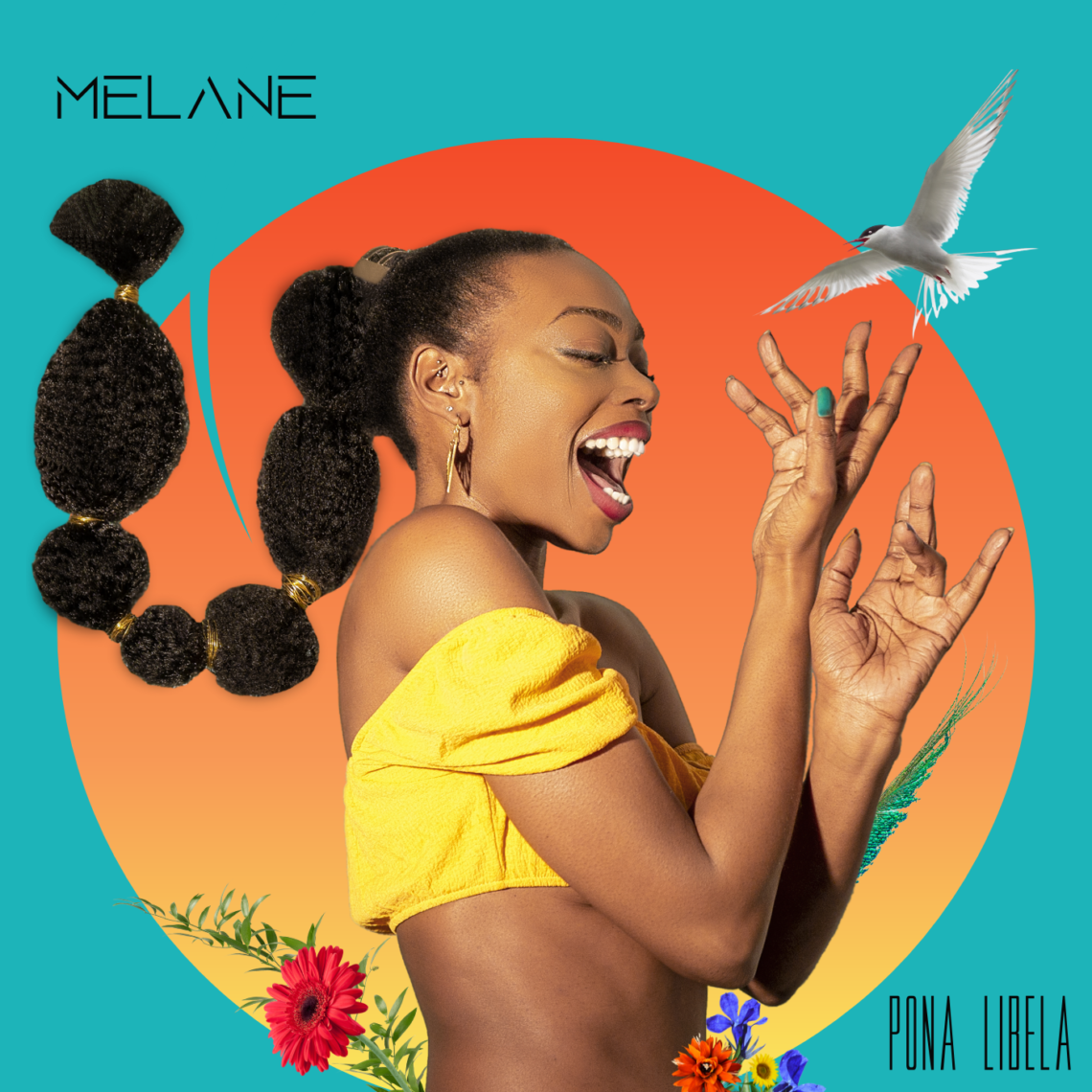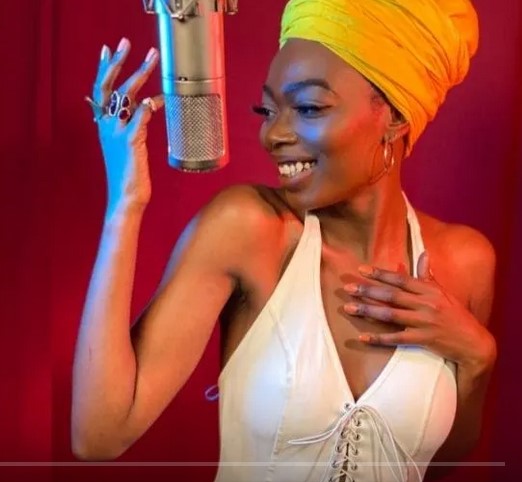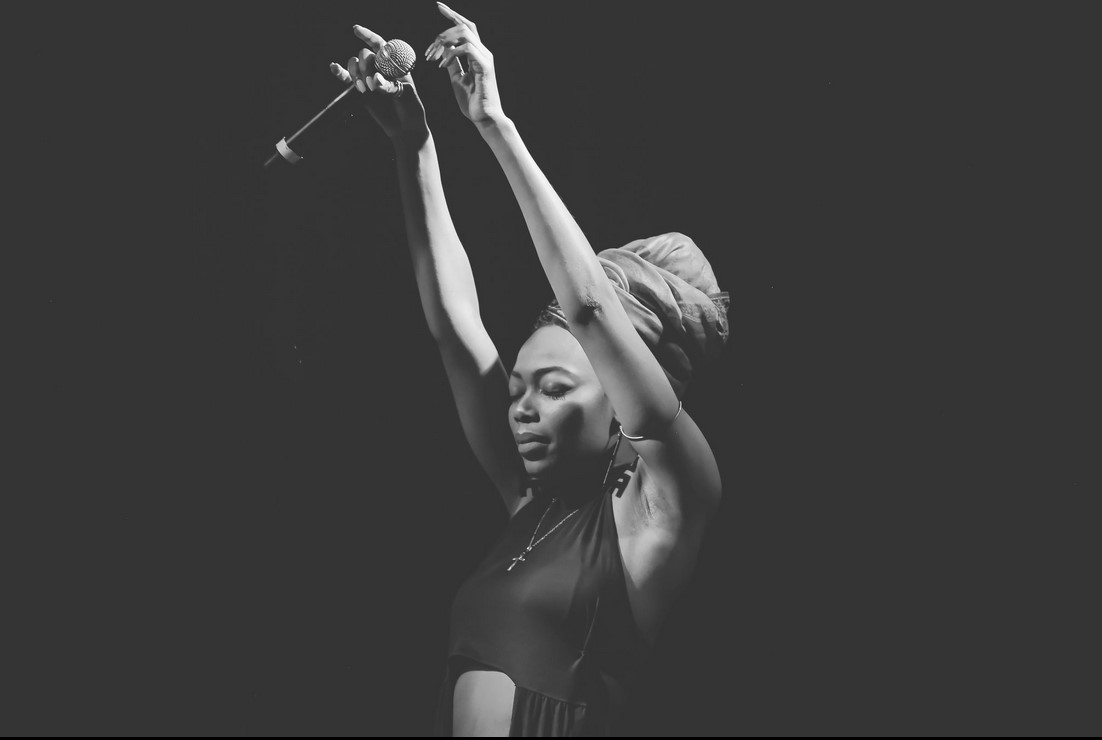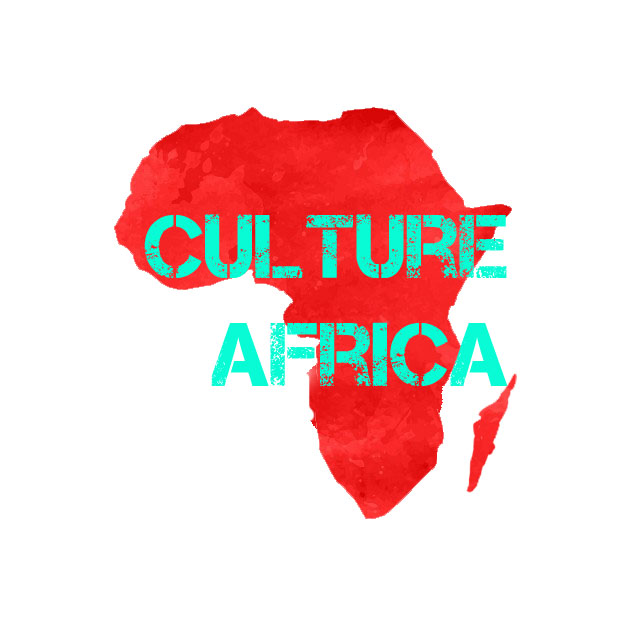
I ve got the power! Interview with musician Melane ger/engl
Am ersten April erscheint ihre nächste Single „Pona Libela“, das Video einen Tag später auf Youtube: Wir sprechen von Melane Nkounkolo besser bekannt als Melane. Sie ist die Powerfrau und Tausendsassa, musikalisch schwer zu fassen. Beeinflusst definitiv aus der Heimat ihrer Eltern, das ist die Republik Kongo im westlichen Zentralafrika. Melane steht für viele Richtungen in der modernen Popmusik, die Traditionen lassen sich aber trotzdem gut raushören. Melane steht aber noch für viel mehr: Musikproduktion!Bloggen!Afrikawissenschaften!Empowerment!
Für cultureafrica sprach Hans Hofele mit Melane.
FOR ENGLISH VERSION PLEASE SCROLL DOWN
HH: Als ich mich über dich informiert habe, deine Musik gehört habe, gesehen habe dass du eigentlich viel mehr bist als Musikerin: nämlich auch studierte Afrikawissenschaftlerin, Bloggerin, und Produzentin, da war ich sehr erstaunt. Eine Musikerin mit so vielen Kenntnissen und wissenschaftlichem Background, das passte bei mir die Rapperin nicht so in mein Bild über dich: Das liegt wahrscheinlich an meinem Klischeebild, kann das sein? Wie würdest du dich beschreiben?
M: Ein Teil davon stimmt. Ich könnte noch viel mehr sagen. Aber ich hab mich so schwer getan, auf diese Frage zu antworten, was ich genau mache, wer bist du? Vor allem die Frage des Genres. Ich mach Vieles, das ist für die Menschen nicht immer greifbar. Wenn man mich auf Lingala singen hört, denkt man nicht daran, dass ich auch Deutsch Rap mache. Das liegt daran, dass ich einfach schon sehr viel gemacht habe in meinem musikalischen Werdegang. Ich bin seit über 15 Jahren Künstlerin und habe mich in den unterschiedlichsten Bands befunden. Auch Rock übrigens! Eine richtig krasse Rockband, die Jungs waren alle viel älter, aber ich fand sehr interessant, was ich da machen konnte. Nur grölen, das ging gar nicht! (lacht)
Mit Hip Hop hatte ich auch früh zu tun.
Erst in letzter Zeit habe ich Rap-Songs aufgenommen; auf Deutsch, weil mich dann die Leute verstehen. Allerdings ist das nicht die Sprache, wo mein Herz klopft. Ich werde immer wieder solche Ausflüge machen, aber meistens ordnen mich die Leute unter Jazz ein. Der Einfluss der kongolesischen Musik ist bei mir sehr stark. Aber auch die Musik aus Kamerun. Ich bin aber dabei, meinen eigenen Sound zu kreieren. Im neuen Album wird das zu hören sein.
HH: Das ist bei einem politischen Stück von dir wie „Einzelfall“, ein auf deutsch gesungener Rap dann schon wieder anders. Sprache ist ja etwas sehr Besonderes in deiner Musik, ob auf Deutsch, Französisch, in Lingala oder Swahili. Ein Song heißt „Kwa Heri“ das ist doch Swahili, oder?
M: Das ist Swahili, aber ich singe überwiegend in Lingala, der Chorus ist aber Swahili. Das ist eine sehr schöne Sprache, die ich aber nicht so gut spreche, obwohl es viele Verbindungen zwischen den beiden Sprachen gibt. Aber ich bin auch Sprachwissenschaftlerin! Das ist also eine Leidenschaft, die Sprachen und ihre Vielfalt. Jede Sprache öffnet dir eine neue Tür, zur Welt, zu Kultur und Menschen. Mit Sprachen sind ja auch verschiedene Konzepte und Vorstellungen verknüpft. Wenn ich zum Beispiel von Wald rede, hat mein Bruder im Kongo ein anderes Bild davon als die Menschen hier in Deutschland.

https://www.youtube.com/watch?v=rUR-rH_I0Zc
HH: Du bist in Velbert im Bergischen Land aufgewachsen. Die Eltern sind aus Kongo-Brazzaville. Die Bilder, die sich bei dir aufbauen, sind die stark von den afrikanischen Eltern und Verwandten und deinen Besuchen dort geprägt oder mehr von deiner deutschen Heimat?
M: Ich betrachte die Heimat meiner Eltern auch als meine Heimat. Deutschland ist meine Heimat, der Kongo aber auch. Manche mögen ja als Deutsche akzeptiert werden, bei mir sind es beide Orte.
Meine ganze Familie ist da. Ich spreche die Sprache und habe die Kultur, so gut es ging, hier zuhause kennengelernt. Über die Musik, auch über Kassetten, die es von dort, aber auch aus Angola und Kamerun gab, habe ich die Musik kennengelernt. Aber natürlich hat sich alles vermengt mit den Einflüssen hier.
HH: Also warst du ab und an zu Besuch in der einen Heimat. War das was Besonderes für dich?
M: Als kleines Kind war ich ein paar Monate im Kongo. Obwohl ich so jung war, habe ich bis heute Erinnerungen an bestimmte Gerüche, die mich sofort an diese Heimat erinnern. Da war ein Gericht: Saka Saka heißt das. Du steigst aus dem Flugzeug und spürst sofort: Ja, ich bin da!
Mittlerweile ist auch mein Vater dort begraben. Er hat auch hier gelebt, er war der Grund, weshalb wir hier sind. Aber bei einem Besuch im Kongo ist er dort verstorben. Ich habe ihn also dann bei einer Reise dort am Grab besucht. Das war nicht so einfach für mich. Jahrelang habe ich vorgestellt, dass es passieren könnte. Aber als ich dann da war und gesehen habe, wo er dort lag, dachte ich: du bist hier richtig, wo du liegst, du hast deinen Platz dort. Du bist von dort gekommen und du bist jetzt wieder hier. Das hat sich sehr gut angefühlt. Dabei habe ich noch meinen Bruder getroffen, er lebt jetzt wieder in Kongo_Brazzaville, er wurde 2018 von hier abgeschoben.
HH: Du bist in Velbert geboren, in Heiligenhaus aufgewachsen. Kleinstadt. Wie war denn deine Berührung mit der Musik? War dir das mit dem Singen und Musik machen schon früh klar?
M: Meine älteste Schwester war selbst Künstlerin. Sie hat mich in ein Tonstudio mitgenommen. Ich habe damals oft Songs aus dem Fernsehen und Radio nachgesungen. Auch Opern. Meine Schwester hat da ein Talent erkannt. In diesem Studio habe ich einen Song aufgenommen. Das war erst mal super für mich. Aber bewundert habe ich die Auftritte meiner Schwester, die war mit einer afrikanischen Musiktruppe unterwegs und genau das wollte ich eigentlich auch. Genau dorthin!

HH: Was war denn die Attraktion dieser Musik? Was hat dich da ergriffen?
M: Der Afropop! Ich nehme Musik vor allem über den Bass wahr. Es hat mich vom musikalischen so mitgenommen, dass ich den Wunsch hatte, in dieser Art von Musik aufzugehen. Und klar, wollte ich auch auf der Bühne stehen. Den Menschen ein gutes Gefühl mit der Musik zu hinterlassen, das ist etwas Großartiges. Und das wollte ich, das will heute noch. Eine tolle Art der Anerkennung by the way. Aber der Weg dorthin war nicht einfach. Ich habe viele Erfahrungen gemacht, als Background Sängerin oder in einer Rockband, das kann ich alles anwenden heute.
Aber das, was ich jetzt rausgebracht habe, da kann ich sagen: das bin ich! Das ist die Musik, die ich machen möchte.
HH: Die Corona-Zeit mit den eingeschränkten Auftrittsmöglichkeiten hat dir doch sicherlich den Start deiner Solokarriere vor harte Proben gestellt?
M: Sicher sind Auftritte sehr wichtig, weil damit wird ja auch Geld verdient. 2020 war so oder so die Zeit gekommen, wo ich entschieden habe, dass ich jetzt mein eigenes Ding machen will. Eigene Musik produzieren, das habe ich mich davor nicht getraut. In der Band Three Fall war ich ja lange eingebunden, das war ja toll, was wir gemacht haben. Aber wenn du eigene Ideen hast, willst du nicht ewig warten, bist du sie umsetzten kannst. Irgendwann ist der Punkt da.
Und dabei mache ich jetzt ganz vieles: produzieren, Songs schrieben, Social Media,… Aber noch mal wegen den nicht möglichen Konzerten; das war ja auch die Zeit, in der man Songs komponieren und aufnehmen konnte, mit der Band proben. Ich habe das genutzt. Wenn es jetzt losgeht, kann ich sagen: Ich bin ready! Ich kanns kaum erwarten. Dann sind wir auch in einem Land, in dem es finanzielle Unterstützung für Kulturschaffende während der Pandemie gab und gibt; in vielen Ländern ist das nicht so.
HH: Wird moderne afrikanische Musik eigentlich in Deutschland ausreichend wahrgenommen? Es herrschen doch auch hier viele Klischees, wie afrikanische Musik sich anhören soll?
M: Deutschland ist da schon speziell, in Frankreich sieht das ganz anders aus. Da gibt es viel größere Communities, was die afrikanische Musik betrifft. Anfangs habe ich auch zu meiner Familie gesagt; Warum seid ihr nicht nach Frankreich ausgewandert? (lacht) Ich wurde schon des Öfteren damit konfrontiert, dass man mich in eine Schublade stecken wollte.Den einen war ich nicht afrikanisch genug, weil ich deutsch rede oder nicht authentisch, weil ich ja hier geboren bin.
Das erinnert mich auch an mein Afrika-Studium an der Uni in Köln: da herrschten teilweise auch ganz komische und verkrustete Ansichten vor. Es sind ja auch kaum Afrikaner:innen als Lehrende dort. Ich habe dann meine Masterarbeit über Hip Hop geschrieben.
HH: War das denn dein Wunsch, speziell Afrikawissenschaften zu studieren?
M: Erstmal war das überhaupt nicht in meiner Vorstellung. Die Uni war für mich immer eine weiße Institution. Da gehen weiße hin, nicht ich. Da würdest du gar nicht schaffen. Mit diesem Mindset hast du natürlich erstmal keine große Motivation für ein Studium. Aber ich habe es durchgezogen.
HH: Du hast gesellschaftskritische Texte, engagierst dich auch gesellschaftspolitisch; spürst du eine Art Zeitenwende nach 2020, als mit dem Tod von George Floyd weltweit Massenproteste aufkamen? Gibt es ein neues Bewusstsein unter Schwarzen oder auch Weißen – für Schwarze?
M: Wenn wir über Rassismus sprechen, ist es ja nicht meine Aufgabe, den Rassismus abzubauen. Weiße Menschen müssen in ihren Strukturen das abbauen. Das ist also deine, eure Aufgabe! Es hat hier dazu geführt, dass sich Schwarze Menschen auch klar so benennen. Nicht nur BiPoC. Das war auch ganz klar: ich benenne mich jetzt als schwarze Frau.
Ich hoffe, der Schwung aus der Aufbruchstimmung nach Georg Floyd ebbt nicht ab. Es haben sehr viele Schwarze Menschen Bücher raus gebracht zum Thema. Es gibt auch Kinderbücher, Diversity-Bücher. Die Communities warten nicht mehr, sie machen. Das finde ich toll. Es muss Safe Spaces geben, aber alle interessierten Menschen sollen auch zu den Veranstaltungen kommen dürfen.

HH: und diese Bücher sind sogar in den Buchhandlungen sichtbar. Da gingen ja, auch durch die zahlreichen Literaturpreise letztes Jahr ein paar mehr Türen auf für afrikanische Literaturen und schwarze Autor:innen.
M: Ich möchte das aber auch für den musikalischen Bereich sehen! Nicht nur wegen mir. Durch meinen Blog „Beautiful Colors“ bekomme ich auch Einblick in die Schwarze Musikszene in Deutschland. Da wird den Künstler:innen oft vorgeworfen, nicht authentisch genug zu sein.
Nach der Kritik am deutschen Jazzpreis 2021 wird auch da umstrukturiert. Kritik wird also auch ernst genommen.
Dabei es gibt in der Musikszene auch ein strukturelles Problem: Frauen sind nicht nur im Jazz unterrepräsentiert: wie viele Schlagzeugerinnen gibt es überhaupt? Wie bekommen wir junge Frauen in die Musikszene, auch in die Produzentenszene. Viele Frauen machen einen Bogen um vermeintlich komplizierte Technik. Ich selbst bin Technik-Affin, würde gerne auch Workshops für junge Frauen geben.
HH: Jungs trauen sich viel mehr zu, obwohl sie es auch meist nicht besser können.
M: Ganz genau! Frauen trauen sich in diesen Bereichen weniger zu. Sie müssten sich viel mehr ausprobieren. Man sieht es ja in speziellen Bereichen, Musikproduktion, Backstage, Technik, da sind wenig Frauen. Das lässt sich aber ändern.
ENGLISH VERSION
On the first of April her next single “Pona Libela” will be released, the video one day later on Youtube: We are talking about Melane Nkounkolo better known as Melane. She is the power woman and jack-of-all-trades, musically elusive. Definitely influenced by her parents’ homeland, which is the Republic of Congo in western Central Africa. Melane stands for many directions in modern pop music, but the traditions are still easy to hear. But Melane stands for much more: music production!blogging!African studies!empowerment!
Hans Hofele spoke with Melane for cultureafrica.
HH: When I read up on you, listened to your music, saw that you are actually much more than a musician: you are also a studied African scholar, blogger and producer, I was very surprised. A musician with so much knowledge and scientific background, the rapper didn’t fit into my image of you: That’s probably because of my cliché image, can that be? How would you describe yourself?
M: Part of it is true. I could say a lot more. But I’ve had such a hard time answering this question of what exactly do I do, who are you? Especially the question of genre. I do a lot of things, it’s not always tangible to people. When you hear me sing on Lingala, you don’t think that I also do German rap. That’s because I’ve simply done a lot in my musical career. I’ve been an artist for over 15 years and have been in all kinds of bands. Rock, too, by the way! A really bad rock band, the guys were all much older, but I found it very interesting what I could do there. Just bawling, that didn’t work at all! (laughs)
I also got into hip hop early on.
Only recently have I been recording rap songs; in German, because then people understand me. However, that’s not the language where my heart beats. I will always make such forays, but mostly people classify me under jazz. The influence of Congolese music is very strong with me. But also the music from Cameroon. But I am in the process of creating my own sound. You will hear that in the new album.
HH: That’s different with a political piece of yours like “Einzelfall”, a rap sung in German. Language is something very special in your music, whether in German, French, Lingala or Swahili. One song is called “Kwa Heri”, which is Swahili, isn’t it?
M: It’s Swahili, but I sing mostly in Lingala, but the chorus is Swahili. It’s a very beautiful language, but I don’t speak it that well, although there are many connections between the two languages. But I am also a linguist! So that’s a passion, the languages and their diversity. Every language opens a new door for you, to the world, to culture and people. There are also different concepts and ideas associated with languages. For example, when I talk about forests, my brother in Congo has a different image of them than people here in Germany.

https://www.youtube.com/watch?v=rUR-rH_I0Zc
HH: You grew up in Velbert in the Bergisches Land. Your parents are from Congo-Brazzaville.
Are the images that build up in your mind strongly influenced by your African parents and relatives and your visits there, or more by your German homeland?
M: I also consider my parents’ homeland to be my homeland. Germany is my home, but so is the Congo. Some people may be accepted as Germans, but for me it’s both places.
My whole family is there. I speak the language and got to know the culture as well as I could here at home. I got to know the music through the music, also through cassettes that were available from there, but also from Angola and Cameroon. But of course everything got mixed up with the influences here.
HH: So you visited your homeland from time to time. Was that something special for you?
M: When I was a little kid, I spent a few months in Congo. Even though I was so young, I still have memories of certain smells that immediately remind me of that homeland. There was a dish called Saka Saka. You get off the plane and immediately feel: Yes, I am there!
I perceive music mainly through the bass. I was so taken by the music that I wanted to be absorbed in this kind of music. And of course, I also wanted to be on stage. To leave people with a good feeling with your music, that’s something great.
Meanwhile, my father is also buried there. He also lived here, he was the reason why we are here. But during a visit to Congo he died there. So I went there on a trip to visit him at his grave. That was not so easy for me. For years I imagined that it could happen. But when I was there and saw where he was lying, I thought: you are right here, where you are lying, you have your place there. You came from there and now you are here again. It felt very good. I also met my brother, he now lives in Congo_Brazzaville again, he was deported from here in 2018.
HH: You were born in Velbert, grew up in Heiligenhaus. Small town. What was your contact with music like? Were you aware of singing and making music at an early age?
M: My oldest sister was an artist herself. She took me to a recording studio. At that time I often sang songs from television and radio. Even operas. My sister recognised a talent there. I recorded a song in this studio. That was great for me at first. But I admired my sister’s performances, she was on tour with an African music group and that’s exactly what I wanted to do. Exactly there!
HH: What was the attraction of this music? What took hold of you there?
M: Afropop! I perceive music mainly through the bass. I was so taken by the music that I wanted to be absorbed in this kind of music. And of course, I also wanted to be on stage. To leave people with a good feeling with your music, that’s something great. And I wanted that, still want that today. A great kind of recognition by the way. But the way there was not easy. I’ve had a lot of experience, as a background singer or in a rock band, I can use all that today.
But what I have put out now, I can say: this is me! That’s the music I want to make.

HH: Surely the Corona period with its limited performance opportunities made the start of your solo career tough for you?
M: Of course gigs are very important, because that’s how money is earned. In 2020, the time came anyway when I decided that I wanted to do my own thing now. I didn’t dare to produce my own music before. I was involved in the band Three Fall for a long time, and what we did was great. But when you have your own ideas, you don’t want to wait forever until you can realise them. At some point the point is there.
And now I’m doing a lot of things: producing, writing songs, social media… But again, because of the impossible concerts; that was also the time when you could compose and record songs, rehearse with the band. I took advantage of that. When it starts now, I can say: I’m ready! I can hardly wait.
Then we are also in a country where there was and is financial support for cultural workers during the pandemic; in many countries that is not the case.
HH: Is modern African music actually perceived sufficiently in Germany? After all, there are a lot of clichés here about what African music should sound like?
M: Germany is special in that respect, in France it’s quite different. There are much bigger communities there as far as African music is concerned. In the beginning, I also said to my family: Why didn’t you emigrate to France? (laughs) I was often confronted with people trying to pigeonhole me.
For some, I wasn’t African enough because I speak German, or not authentic enough because I was born here.
That also reminds me of my African studies at the university in Cologne: there, too, some very strange and encrusted views prevailed. There are hardly any Africans teaching there. Then I wrote my master’s thesis on hip hop.
HH: Was it your wish to study African studies in particular?
M: First of all, it wasn’t in my imagination at all. The university was always a white institution for me. White people go there, not me. You wouldn’t make it there at all. With this mindset, of course, you don’t have much motivation to study. But I went through with it.
HH: You have socio-critical lyrics, you are also involved in socio-politics; do you sense a kind of turning point after 2020, when mass protests arose worldwide with the death of George Floyd? Is there a new awareness among blacks or also whites – for blacks?
M: When we talk about racism, it is not my task to dismantle racism. White people have to dismantle it in their structures. So that is your task, your task!
It has led here to black people also clearly naming themselves that way. Not only BiPoC.
It was also very clear: I now call myself a black woman.

I hope the momentum from the post-Georg Floyd awakening doesn’t die down. A lot of black people have published books on the subject. There are also children’s books, diversity books. The communities are no longer waiting, they are doing. I think that’s great. There have to be safe spaces, but all interested people should also be allowed to come to the events.
HH: And these books are even visible in the bookshops. Because of the numerous literary prizes last year, a few more doors opened for African literature and black authors.
M: But I would also like to see this in the musical field! Not only because of me. Through my blog “Beautiful Colors” I also get an insight into the black music scene in Germany. Artists are often accused of not being authentic enough.
After the criticism of the German Jazz Prize 2021, they are restructuring there too. So criticism is also taken seriously.
But there is also a structural problem in the music scene: women are underrepresented not only in jazz: how many female drummers are there anyway? How do we get young women into the music scene, also into the producer scene? Many women give supposedly complicated technology a wide berth. I myself am a technophile and would like to give workshops for young women.
HH: Boys are much more confident, although they usually can’t do any better.
M: Exactly! Women are less confident in these areas. They should try themselves out much more. You can see it in special areas, music production, backstage, technology, there are few women. But that can be changed.
The Blog:
https://www.melanemusic.com/beautiful-colours-ge/
https://distrokid.com/hyperfollow/melane/pona-libela
The Video:
https://www.youtube.com/channel/UCTG8ahSDDkjWTYBpwN_FwBQ
copyright: cultureafrica 2022



